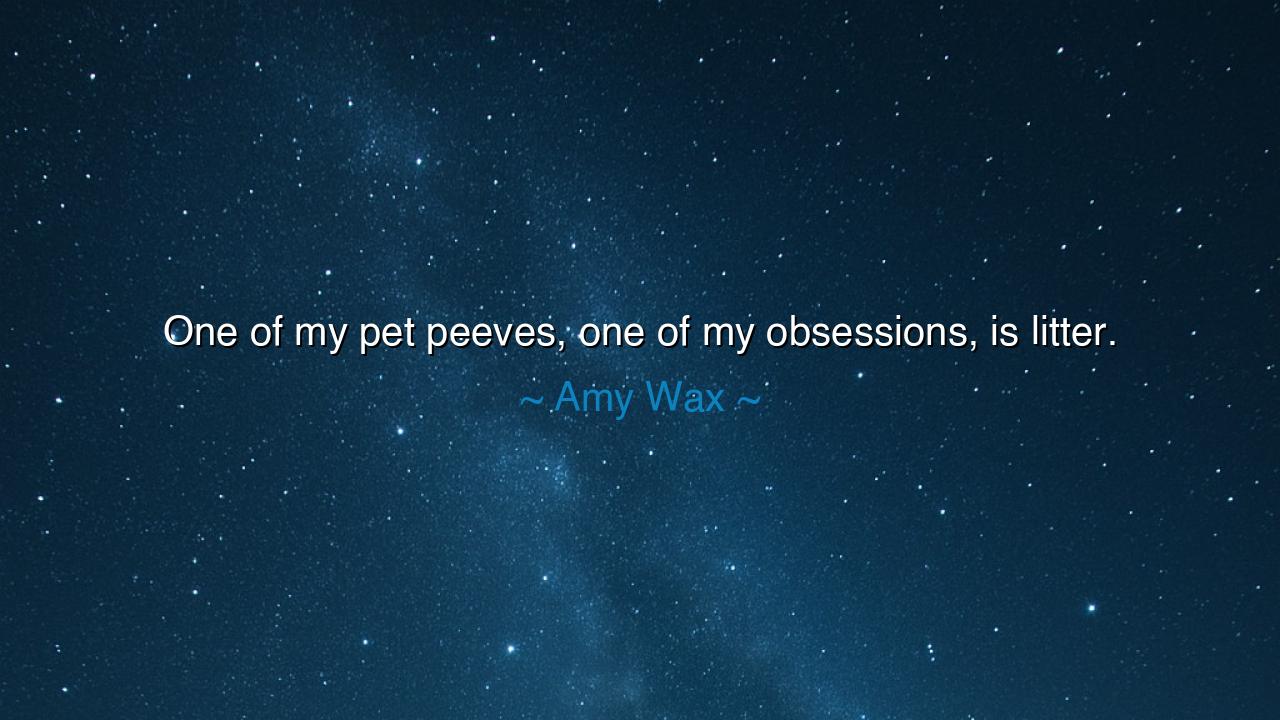
One of my pet peeves, one of my obsessions, is litter.






In the words of Amy Wax: “One of my pet peeves, one of my obsessions, is litter.” At first glance, this saying seems simple, almost trivial, as if it concerned only scraps of paper and discarded bottles along the roadside. Yet, when heard with the ears of wisdom, it resounds like a moral commandment. For litter is not only the waste of the earth—it is the waste of spirit, the neglect of beauty, and the disregard of the sacred bond between humanity and the soil from which it springs. To despise litter is to love order, harmony, and the dignity of one’s surroundings.
The ancients knew this truth well. The Greeks built temples not merely to house their gods but to honor them with cleanliness and proportion. The Romans maintained aqueducts, baths, and roads, understanding that the prosperity of a people depends upon the purity of its common spaces. To cast filth into the streets was not only unwise, it was impious. In every culture, from the sweeping sands of Egypt to the stone shrines of the Mayans, one sees the same principle: to defile the environment is to invite decay into the soul of a people. Thus, Wax’s obsession is not petty—it is ancient, timeless, and worthy of emulation.
Consider the story of Singapore, a modern city-state that once struggled with squalor. Its leaders, understanding that a clean land creates a disciplined people, declared war on litter. Laws were written, fines enforced, and campaigns waged to teach respect for public space. Today, Singapore is revered as one of the cleanest cities in the world, and travelers marvel at its streets free of refuse. It stands as proof that attention to the smallest act—whether throwing away gum or paper—can transform the destiny of an entire nation. A people who honor their environment honor themselves.
When Wax declares litter to be her pet peeve, she reveals more than irritation—she unveils a principle. For small acts of neglect grow into mountains of corruption. A wrapper tossed today becomes the habit of disregard tomorrow, and from disregard comes decay of neighborhoods, then cities, then civilizations. The poet Hesiod once wrote that good order begins at the hearth. To tend one’s home, to guard the streets, to keep the rivers pure—these are not mundane tasks, but sacred duties.
But there is also power in her word obsession. To be obsessed is not to casually disapprove, but to burn with passion against what is unworthy. It is to make war upon ugliness, to rally the spirit like a soldier against an enemy. Litter is not only the debris of matter—it is the symbol of thoughtlessness, the mark of carelessness, the sign that humanity has forgotten its covenant with the earth. In this sense, Wax calls us not to irritation but to vigilance. She invites us to cultivate the fierce guardianship of beauty, to be watchful over what is small lest it corrode what is great.
The lesson is clear: respect your surroundings, for they are the mirror of your soul. If your streets are strewn with trash, your spirit will be weighed down with the same heaviness. If your fields are choked with waste, your heart will not breathe freely. But if you honor the ground you walk upon, the air you breathe, the waters you drink, then you shall live in harmony with the divine order that shaped the world.
Practical actions must follow this wisdom. Carry your waste to its proper place. Reuse what may be saved, recycle what may be renewed, and refuse what need not be created. Do not pass by a piece of litter without stooping to remove it, for in that simple act you declare allegiance to cleanliness, discipline, and respect. Teach children not only the rules of speech and number, but the sacredness of leaving no trace upon the land. Let every traveler, every citizen, every child of earth, become a steward of purity. For when each hand tends to the smallest thing, the greatness of civilization is preserved.
Thus, in Wax’s words lies an eternal truth: to fight litter is to fight for dignity itself. What may appear an obsession is in fact a devotion—to beauty, to discipline, to the bond between humankind and the world. Let us heed it as the ancients would: not as a complaint, but as a commandment, as a flame to be carried into the future. For where there is no litter, there the soul walks lighter, and there, the earth itself sings.






AAdministratorAdministrator
Welcome, honored guests. Please leave a comment, we will respond soon